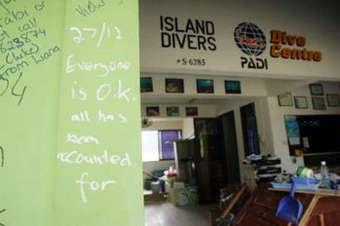|
Tusnami leaves legacy of crushing ruin
(China Daily)
Updated: 2005-01-09 22:33 Don't shoot the messenger in truth
quest
by Ong Soh Chin, The Straits
Times/Singapore
SINGAPORE: When I told someone the day after the tsunami struck that
I might be going to Sri Lanka to cover the story, she mentioned that she had a
Sri Lankan friend in Singapore who had relatives there.
"He said tourists just waited till stuff got cleaned up and then
went back to the beach," she told me. I asked if I could have her friend's
number so I could talk to him and, to my surprise, she said no.
"Oh. I don't really like to give contacts of people to journalists. It's okay
if it's fun and all. But people are grieving and they should be left alone if at
all possible," she added, with an apology.
That remark sparked a mild sense of outrage in me. For there it was, out in
the open. When push came to shove, to this person, I was not a friend or even a
human being, but a 'journalist,' as if my profession excluded me from all
feeling, sensitivity or compassion.
My heart goes out to those who have suffered because of the tsunami, and I am
not saying there is no cause for complaint.
A grieving family has its right to grieve and to get angry and emotional, but
a reporter has a responsibility to ask difficult questions in order to convey
the magnitude of loss and suffering to the world.
There is no getting away from the fact that the saddest stories move people
to act -- as we have seen in the massive outpouring of sympathy, donations and
volunteer efforts since this disaster struck.
A surprising story
I received an impassioned e-mail from a Mr John Gray who runs a dive
facility in Phuket, imploring tourists to return.
While I totally understand and share his sentiments -- the worst thing now is
for everybody to shun Phuket, depriving its people of their livelihood -- I take
umbrage with his dismissive references to "irresponsible media and government
reports" that discourage travellers from going to Phuket. "The Thai disaster
relief effort is extremely well organized, and we don't need the Red Cross,
UNICEF or other relief assistance. Save that for Indonesia, Sri Lanka and
India," he writes.

A message scribbled
on a wall of a diving center in Thailand's tourist island of Phi Phi,
January 2, 2005 after the quake-triggered tsunami that battered the
islands of southern Thailand.
[Reuters] |
Elsewhere, he continues:
"International news services focus on the grisly aspects of the disaster.
Reporters tell the world the story of devastation; cameras capture the rubble
and the bodies. They tell of total destruction here -- a gross distortion of the
truth." There's more: "I'm truly disgusted to see how sloppy and irresponsible
media led by CNN and the British press can be."
Responsible journalists
It is at times like these that I feel I have to step up to the bat
and defend my profession.
Indeed it is times like these that I feel proudest of my profession.
While people like Mr Gray are understandably emotional, I do not see how news
reports are distorting the "truth" when the fact is a total of 155,000 (and
counting) people have died from this disaster.
And I have not encountered any news stories telling people to stay away from
Phuket or other badly-hit areas, unless they are reports quoting government
advisories.
I have just returned from Penang and Phuket and will be going to Aceh next.
All across Phuket, I encountered journalists from other countries, all of
whom have the same thousand-yard stare of the weary who have seen the
unspeakable.
No one who works for a news agency is in Phuket to have a good time now.
These are journalists who rushed to the scene the moment disaster struck.
As a disaster of this scale has probably never been experienced in this
lifetime before, they also went in with no psychological preparation, no idea of
what to expect or how to react to seeing and smelling thousands of decomposing
bodies being dragged out of the sea.
They also went in with the full knowledge that there would be aftershocks
that could result in more tsunamis.
Apart from the Phuket team, Straits Times photographer Aziz Hussin and
reporter Azhar Ghani dashed to Aceh on December 28, with no proper idea of how
they would actually reach Banda Aceh. Aziz, who went first via Medan, took about
two days to finally reach his destination, reporting his progress to the office
with the rare intermittent phone call, as communications are non-existent in
that area.
On TV, I have seen incredible reports by journalists. Sure there are the
requisite panoramic shots of flattened terrain, corpse-lined streets and weeping
people. But this is the reality, which leads one to the moral debate of whether
the public needs to be confronted with it.
Would you prefer it if TV reporters had decided to do their stand-uppers with
a pretty palm tree in the background instead?
And if so, would countries and organizations have reacted as quickly or
increased their financial support if all they saw and read from journalists were
airbrushed stories that masked the real scale of the tragedy?
Don't shoot the messenger just because you don't like the message.
| |
 |
|
 |
|
|
Today's
Top News |
|
|
|
Top China
News |
 |
|
 |
|
|
|
|
|
|